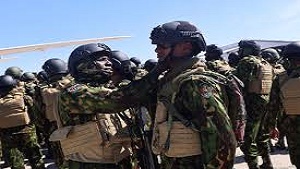“I don’t drink the tap water,” she said, outside a supermarket where she was buying locally-bottled Lafort water. A relatively low-cost brand, Lafort is double the price of an equivalent product in parts of Paris.
Anger at Martinique’s prices and poor services erupted in months of protests and unrest late last year that saw dozens of businesses targeted and burned.
The protests have largely given way to a movement that has won concessions from Paris, including a promise last week of government-backed legislation to tackle grocery prices, which official data shows are on average 40% higher than on the mainland.
Like many contentious issues in Martinique, water is intertwined with questions of class and race, including the prominence of a handful of families descended from white owners of enslaved people.
Known locally as Békés, the white creole families make up about 1% of the population but control swaths of the economy on the island of 350,000 people, the majority of whom are Afro-Caribbean, or descendants of Indian and Chinese indentured labourers.
The government has promised to open up the economy, but activists remain sceptical.
On a visit to Martinique on March 17, Overseas Minister Manuel Valls met with local politicians and business leaders, including Stephane Hayot, son of Martinique’s most successful businessman Bernard Hayot, whose supermarket-to-car dealerships company Groupe Bernard Hayot has been a target of protesters’ ire.
Valls called on the businessmen to be more transparent about profits, saying “unfair” supply chains and opacity stifled the economy. He said the government would soon pass a law to fight anti-competitive practices, building on two bills already in parliament.
Activists, some of whom call for independence, say more must be done. They are planning new protests around a trial next week against three protesters.
--Reuters--












